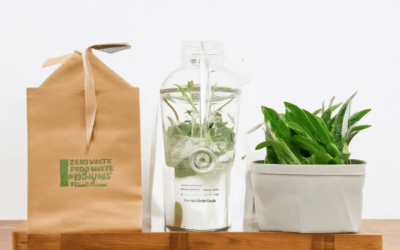Living sustainably has become a cornerstone of modern, eco-conscious living, offering practical ways to reduce our environmental footprint while enhancing our daily lives. From reducing waste to conserving resources, adopting sustainable practices has never been more accessible or necessary. In this guide, we’ll explore actionable tips and hacks that empower you to create a greener world, one small change at a time. Whether it’s minimizing food waste, choosing eco-friendly products, or finding innovative ways to reduce your carbon footprint, these sustainable lifestyle hacks provide a roadmap for making a meaningful impact. By integrating these tips into your routine, you can not only benefit the planet but also cultivate healthier, more mindful habits. Let’s dive into the essential strategies for embracing a more sustainable way of life.
Key Takeaways
- Reduce Waste: Composting kitchen scraps and yard waste to create fertilizer and reduce landfill use.
- Conserve Energy: Switching to energy-efficient LEDs and powering off electronics when not needed.
- Save Water: Using low-flow fixtures and collecting rainwater for outdoor use.
- Sustainable Transportation: Biking, walking, carpooling, or using public transit and considering electric vehicles.
- Eco-Friendly Diet: Adopting a plant-based diet and purchasing local, organic foods.
- Minimize Plastic Use: Using reusable containers and bringing own bags to reduce plastic dependency.
- Support Sustainability: Purchasing from eco-friendly brands and participating in tree-planting efforts.
- Advocate for Change: Engaging in environmental campaigns and supporting sustainable policies.
- Educate and Inspire: Sharing knowledge to encourage others towards sustainable living.
- Choose Eco-Friendly Products: Opting for recycled toilet paper to reduce plastic use and environmental impact.

The 7 Rs of Sustainable Living
Sustainable living is a lifestyle that focuses on reducing harm to the environment while promoting social and economic well-being. One popular framework for understanding sustainable living is the 7 Rs, which extend the traditional 3 Rs of reduce, reuse, and recycle. These principles provide a holistic approach to living more eco-consciously. Here’s a breakdown of each:
- Reduce : Minimize consumption of non-renewable resources and avoid wasting materials. Simple daily actions like turning off lights or reducing plastic use can make a big difference.
- Reuse : Find creative ways to give items a second life. For example,旧衣物可以变成清洁布,玻璃罐可以用作储存容器。
- Recycle : When reduce and reuse aren’t possible, recycling is the next best option. Ensure you’re recycling correctly by checking local guidelines and separating recyclables from trash.
- Refuse : Refrain from purchasing items that contribute to waste, such as single-use plastics or unnecessary packaging. Support companies that offer sustainable alternatives.
- Rethink : Challenge conventional habits and explore eco-friendly alternatives. For example,使用公共交通或骑行替代开车,可以减少碳排放。
- Repurpose : Transform discarded items into something useful. This not only reduces waste but also sparks creativity and resourcefulness.
- Regift : Give thoughtfully and sustainably. Opt for secondhand gifts or homemade items whenever possible.
Eco Planeta Verde encourages everyone to adopt these practices in their daily lives. By embracing the 7 Rs, individuals can significantly reduce their environmental footprint while fostering a more sustainable future. Visit our sustainable living guide for more tips and resources to get started!
How Can We Make Our Lifestyles More Sustainable?
Sustainability is a lifestyle choice that benefits both individuals and the planet. By adopting eco-friendly habits, we can reduce our environmental footprint while improving our quality of life. Here are some practical steps to make your lifestyle more sustainable:
- Diet and Food Choices: Opt for plant-based meals, reduce meat consumption, and choose locally-sourced, seasonal foods. Eating sustainably can lower your carbon footprint and promote healthier living.
- Consume Mindfully: Minimize waste by avoiding single-use plastics and choosing products with minimal packaging. Support fair trade and ethical brands to ensure responsible production practices.
- Waste Management: Practice the 3Rs: Reduce, Reuse, and Recycle. Separate recyclables, compost organic waste, and donate or repurpose items rather than discarding them.
- Energy Conservation: Turn off lights and electronics when not in use, and switch to energy-efficient appliances. Consider solar power or wind energy options for your home.
- Transportation: Use public transport, bike, or walk whenever possible. Reduce reliance on fossil fuels by choosing more sustainable modes of transportation.
- Mental Well-being: Engage in activities that bring joy without harming the environment, such as reading, hiking, or practicing mindfulness. Find balance in your daily routine.
- Community Involvement: Join local sustainability initiatives or volunteer groups to contribute to larger environmental goals. Work together to create a more sustainable future.
Eco Planeta Verde offers valuable resources to help you adopt these sustainable practices. Explore their guides on sustainable products , zero-waste recipes , and renewable energy solutions. Their platform provides practical tips and inspiration for leading a greener lifestyle.
By taking these steps, you can create a more sustainable and fulfilling lifestyle while contributing positively to the environment. Remember, every small change makes a difference!

How to Live 100% Sustainably?
Sustainability is a lifestyle choice that requires intentional effort and awareness. Here’s a comprehensive guide to living a completely sustainable life:
- Reduce Waste: Start by minimizing your waste production. Practice recycling, composting kitchen scraps, and reducing plastic use. Consider using reusable products like cloth napkins, water bottles, and containers.
- Consserve Energy: Opt for renewable energy sources like solar power or wind energy. Reduce energy consumption by using energy-efficient appliances and turning off lights when not needed. Invest in insulation and smart home devices to lower energy bills.
- Adopt Sustainable Transportation: Use public transport, cycle, or carpool to reduce greenhouse gas emissions. Consider purchasing an electric vehicle for a low-carbon option.
- Eco-Friendly Diet: Choose a plant-based diet to reduce your carbon footprint and water usage. Support local farmers by buying seasonal, organic produce whenever possible. Minimize food waste by planning meals and storing leftovers properly.
- Conserve Water: Install water-saving fixtures and aerators. Harvest rainwater for outdoor use or irrigation. Avoid unnecessary watering of lawns and gardens during drought periods.
- Buy Thoughtfully: Purchase products made from recycled materials and support fair trade practices. Shop locally whenever possible to reduce transportation emissions. Opt for organic and biodegradable products.
- Minimize Chemical Use: Use natural cleaning products and personal care items. Avoid harmful chemicals found in conventional products. Research labels and ingredients before purchasing.
- Sustainable Fashion: Buy clothing made from sustainable materials like organic cotton, hemp, or bamboo. Repair garments instead of discarding them. Explore secondhand shopping or clothing swaps to extend the life of items.
- Engage in Community Efforts: Volunteer for local environmental organizations or participate in clean-up events. Join online communities or forums focused on sustainability to connect with like-minded individuals.
Living sustainably doesn’t mean perfection—it’s about making small, consistent changes. Every effort contributes to a healthier planet for future generations. Start today and see how simple changes can create a big impact!

How Can I Be 100% Eco-Friendly?
To achieve a completely eco-friendly lifestyle, consider implementing the following strategies:
- Reduce Waste : Practice composting to convert kitchen scraps into nutrient-rich fertilizer, minimizing landfill use.
- Conserve Energy : Replace traditional bulbs with energy-efficient LEDs and power off electronics when not in use.
- Save Water : Opt for low-flow fixtures and limit shower time to conserve water.
- Sustainable Transportation : Choose cycling, walking, carpooling, or public transit for short trips and consider electric vehicles.
- Eco-Friendly Diet : Adopt a plant-based diet and buy local, organic foods to reduce environmental impact.
- Minimize Plastic Use : Use reusable containers and bring your own bags to reduce plastic consumption.
- Support Sustainability : Purchase from brands committed to eco-friendly practices and sustainable agriculture.
- Tree Planting : Engage in tree-planting initiatives to combat carbon emissions.
- Advocate for Change : Participate in environmental campaigns and support policies promoting sustainability.
- Educate and Inspire : Share knowledge about eco-friendly practices to encourage others to adopt similar lifestyles.
By integrating these practices into daily life, one can significantly contribute to environmental preservation and promote a sustainable future.
Five Eco-Friendly Habits
- Recycle Responsibly: Make sure to separate recyclables from trash and familiarize yourself with your local recycling guidelines to maximize efficiency.
- Compost Regularly: Start composting kitchen scraps and yard waste to create nutrient-rich soil and reduce landfill waste.
- Reduce Plastic Use: Use reusable containers, water bottles, and bags to minimize single-use plastics in your daily routine.
- Save Energy: Turn off lights and electronics when not in use, and consider upgrading to energy-efficient appliances.
- Conserve Water: Fix leaky pipes, install water-saving fixtures, and collect rainwater for outdoor use when possible.

What is the Most Environmentally Friendly Toilet Paper?
Eco-friendly toilet paper is essential for reducing your bathroom’s carbon footprint. We’ve carefully selected top-rated brands that prioritize sustainability and are readily available online.
Top Picks:
- Eco Planeta Verde’s Recommended Choice: Seventh Generation 100% Recycled 2-Ply Bath Tissue
- Target Everspring 100% Recycled Toilet Paper Rolls
- 365 by Whole Foods 100% Recycled Bath Tissue
- Marcal 100% Recycled 2-Ply Toilet Paper
Why These Brands?
These brands stand out for their commitment to sustainability, using responsibly sourced materials and minimizing environmental impact. They are also free from harmful chemicals, making them safer for your family and the planet.
For more tips on sustainable living, check out our Eco-Friendly Living Guide and learn how to reduce your bathroom’s ecological footprint beyond toilet paper.
Conclusion:
Choosing eco-friendly toilet paper is a simple yet impactful way to contribute to a healthier planet. By supporting brands that prioritize sustainability, you’re helping to conserve resources and protect the environment for future generations.




0 Comments